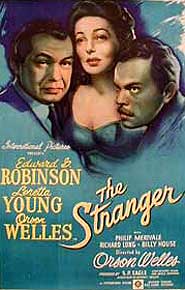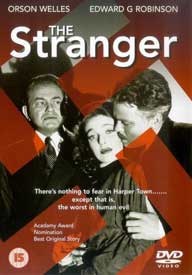 The Stranger (1949) is a spy tale reminiscent of early Hitchock, but with artfully exaggerated film noir shadows.
The Stranger (1949) is a spy tale reminiscent of early Hitchock, but with artfully exaggerated film noir shadows.
Konrad Meinike (Konstantin Shayne), a nerve-wracked enemy agent who in the wake of Germany's defeat has found Jesus, has been permitted to escape.
Agent Wilson (Edward G. Robinson), a Nazi hunter from the United Nations, trails Konrad, whose movements were accurately predicted.
He seeks out & his fellow Nazi Franz Kindler, who chameleon-like has has become Professor Charles Rankin (Orson Welles) in a small college town in Connecticut.
His loony intention is to bring Jesus into the heart of a man who dreams only of the revival of the Nazi agenda. Rankin/Kindler realizes at once that the nutty Jesus freak has imperiled Rankin's carefully constructed identity.
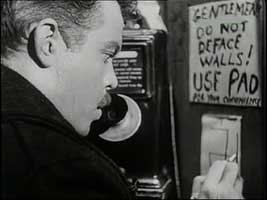 He kills Meinike before Wilson can make a definite connection between them. He kills Meinike before Wilson can make a definite connection between them.
There follows a cat-&-mouse game between Rankin & Wilson, as Rankin descends into a paranoid state believing he can kill his way back to safety undercover.
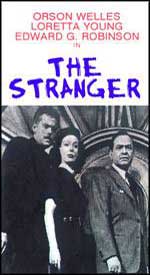 Rankin marries the bordinghouse landlady Mary Longstreet (Loretta Young) & seems really to love her, but not enough to leave her out of his paranoid equations. Rankin marries the bordinghouse landlady Mary Longstreet (Loretta Young) & seems really to love her, but not enough to leave her out of his paranoid equations.
When Mary's dog begins digging at the secret grave of Meinike, Rankin feels he has no choice but to kill the dog.
The church's clock tower has not worked for years. In Germany, the Nazi commandant Franz Kindler had been devoted to clock repair as a hobby.
The fact that Rankin has been trying to repair the clock since his arrival in the town is just one of the many reasons Wilson knows the man's identity, if only it can be proved.
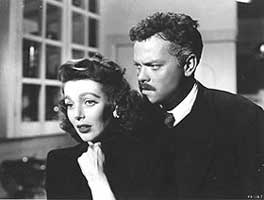 As he continues to deteriorate under Wilson's pressure, Rankin decides to kill Mary, & rigs up the enormous ladder to the clock tower to do the job. As he continues to deteriorate under Wilson's pressure, Rankin decides to kill Mary, & rigs up the enormous ladder to the clock tower to do the job.
Fortunately this fails. But the final ultra-Hitchockian action sequence in the tower involves the mainspring's malfunction & the whirling iron knight who marches on the hour coming after Rankin/Kindler.
In the street below, the townfolk have turned out to see the capture of the Nazi, who had regarded them as "ants" & himself as God observing them from the clock tower.
The very clock has turned against him, & the gathering crowd gives the scene a bit of a James Whale feeling of the peasants after the Frankenstein monster.
Robinson & Welles, two of America's finest actors, play off one another superbly. It's a dead-center "commercial" film rather than a great work of art, but with Welles as director & star it couldn't help but come out just a little special, & the gloomy shadowiness of the b/w cinematagraphy is well above the average.
copyright © by Paghat the Ratgirl
|
